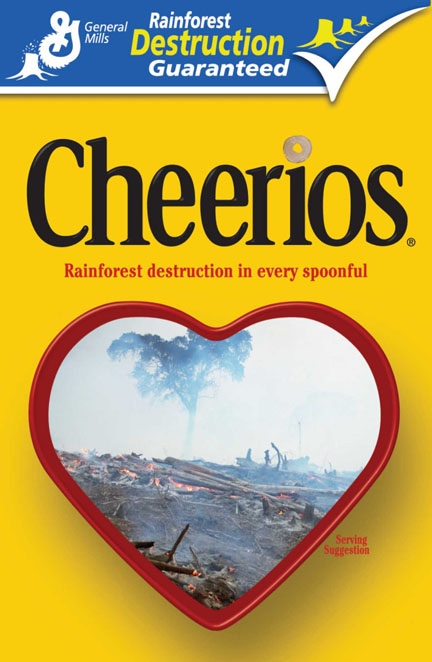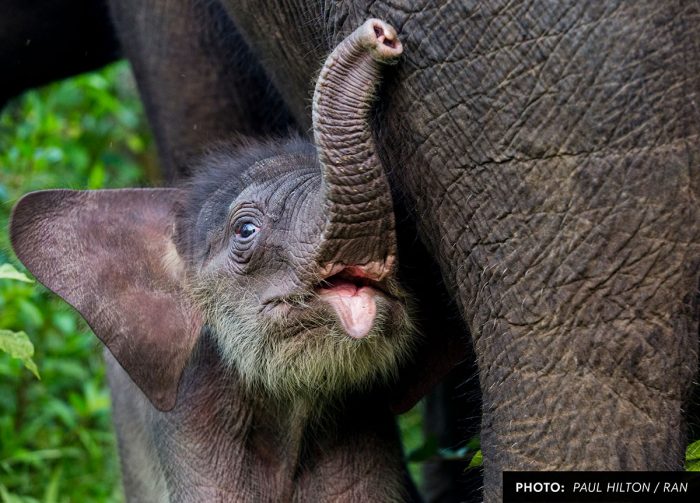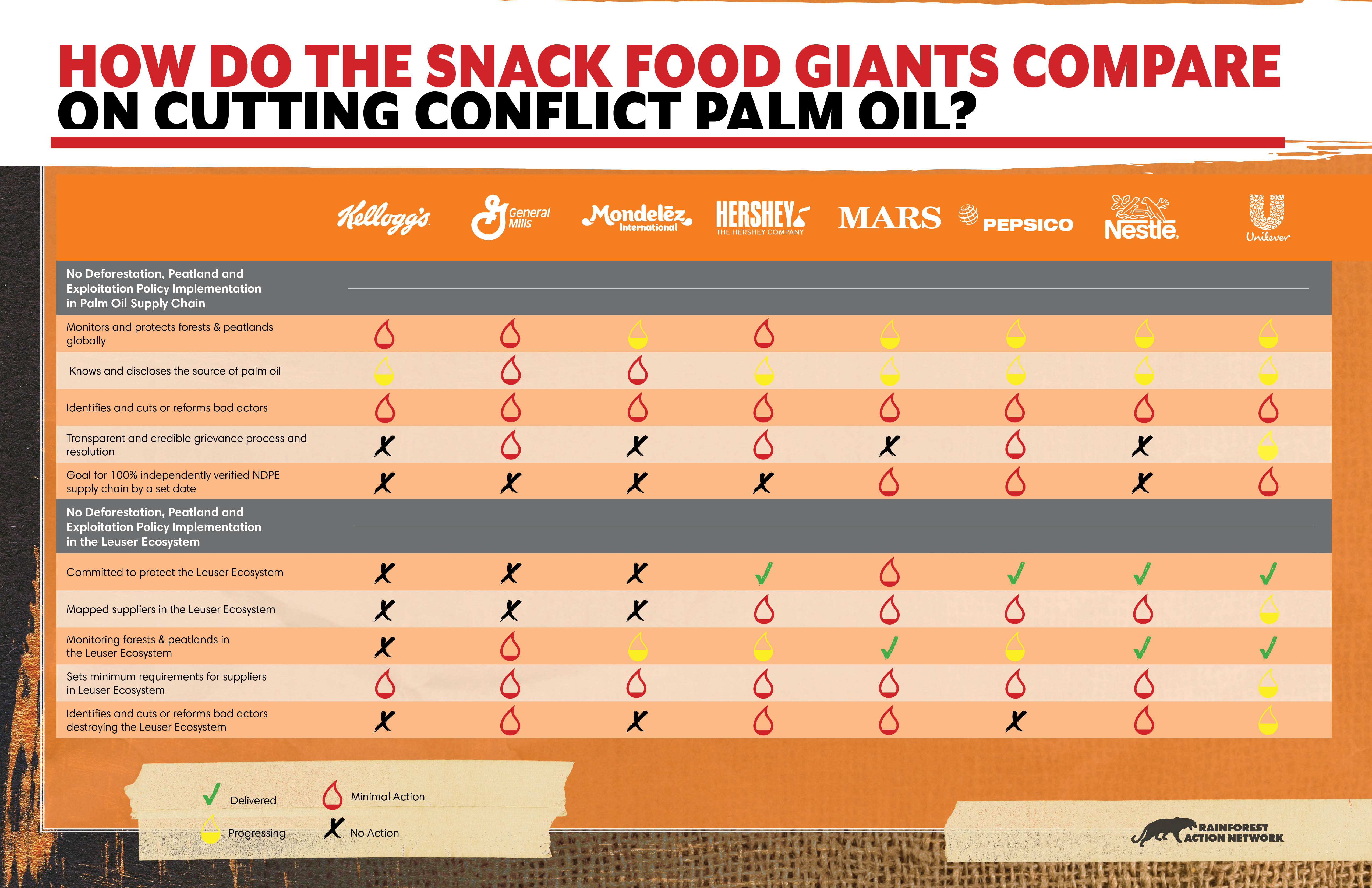Thanks to the actions taken by folks like you, snack food companies have made policy promises to eliminate human rights abuses and forest destruction from their supply chains, and 2020 stands as a critical year to deliver on these promises. With 2020 upon us, we assessed major companies sourcing from the globally significant Leuser Ecosystem in Indonesia to determine if they have taken accountability — in the Leuser and across the globe —for the impact of their consumption of Conflict Palm Oil. Conflict Palm Oil is a highly controversial ingredient which, when produced irresponsibly, leads to rainforest destruction and development on peatlands, both significant contributors to the current climate crisis and to the exploitation of Indigenous Peoples, local communities and workers.
We surveyed eight of the largest global consumers of palm oil on key aspects of the implementation of their policies across their palm oil supply chains — which stretch from Indonesia to the Amazon and the Congo — and assessed their level of commitment, and interventions taken, to protect the lowland rainforests and peatlands of the Leuser Ecosystem — the heart of southeast Asia’s rainforest region — from palm oil expansion.
Our assessment has found that the paper promises of Unilever, Nestlé, PepsiCo, Mondelēz, General Mills, Kellogg’s, Mars and The Hershey Company have not stopped deforestation, have not mitigated threats to endangered species, and have not delivered remedy for the exploitation of Indigenous Peoples, local communities and workers.
The critical year of 2020 is here and actions taken by major consumer brands have fallen short of what is needed to address the impacts of their ever-growing consumption of Conflict Palm Oil:
The traceability, monitoring, verification and grievance systems that all eight snack food giants have established and rely upon, are simply not effective in preventing products from being contaminated with Conflict Palm Oil.
So how do the Snack Food Giants compare?
Over the past five years, some progress has been made to reform the palm oil industry since most of the Snack Food 20 companies adopted responsible palm oil policies that prohibited deforestation, peatland development and exploitation. Unilever, the world’s largest single buyer of palm oil, has made some progress through its investments in establishing collaborative deforestation monitoring systems and innovative ways to track the source of the palm oil it uses. But as the ‘leader’ in the pack, it has still fallen short on the delivery of forest protection and remedy for labor and land rights abuse prevalent in its supply chain and, like its peers, it still lacks adequate systems for identifying, cutting or reforming suppliers responsible for atrocities which include the use of violence, intimidation and criminalization of Human Rights Defenders. In the last month, Unilever, PepsiCo, Nestlé, and The Hershey Company have delivered much-needed commitments to protect the Leuser Ecosystem from further destruction fueled by their sourcing of Conflict Palm Oil from the region.
Kellogg’s, General Mills and Mondelēz are performing the worst, with only minimal actions being reported to consumers concerned about the use of Conflict Palm Oil to manufacture their cereals, chocolates, and candies. All of the companies have increased transparency and have begun reporting on the palm oil mills they source from but, to date, not one company can communicate to consumers the plantations or farms where all the palm oil they sourced was grown; achieving this level of traceability is a critical milestone in demonstrating progress towards the full implementation of their responsible palm oil policy commitments.
 Kellogg’s stands out as the worst performer for its failure to undertake significant implementation actions compared to its peers. Kellogg’s has largely focused on increasing its use of Roundtable of Sustainable Palm Oil (RSPO) certified palm oil — which is not enough given the RSPO lacks the systems needed to guarantee responsible practices of its certified members—and the majority of the certified palm oil that Kellogg’s sources is mixed with controversial Conflict Palm Oil (called “RSPO Mass Balance”).
Kellogg’s stands out as the worst performer for its failure to undertake significant implementation actions compared to its peers. Kellogg’s has largely focused on increasing its use of Roundtable of Sustainable Palm Oil (RSPO) certified palm oil — which is not enough given the RSPO lacks the systems needed to guarantee responsible practices of its certified members—and the majority of the certified palm oil that Kellogg’s sources is mixed with controversial Conflict Palm Oil (called “RSPO Mass Balance”).

In response to RAN’s palm oil campaign, launched by our team and with the support of many of you, General Mills committed to a responsible palm oil policy. But that was nearly a decade ago. Our assessment shows that General Mills has fallen from being a frontrunner and is now lagging behind its peers in implementation. General Mills is promising to do more in 2020 to monitor deforestation in its supply chain but time will tell if its latest pledge amounts to real change where it matters most: on the frontlines of rainforest destruction.
The threats to tropical rainforests have never been greater. Despite corporate commitments against deforestation, forests around the world continue to fall. The science is clear: we only have a few years left to avert the worst effects of climate change, which threatens the future livability of our very planet. There are no credible reasons why these Snack Food Giants should be sourcing Conflict Palm Oil when responsible palm oil is available from the Palm Oil Innovation Group—the only third-party-verified palm oil free of deforestation, peatland development and exploitation.
We will continue to fight for a future where forest ecosystems are abundant, the global climate is stable, and healthy communities thrive. As we begin 2020, join us as we demand more action from Kellogg’s and General Mills, the Snack Food giants who have taken the least responsibility for their role in the social and environmental impacts of Conflict Palm Oil production.
***Find out more about the assessment here.

